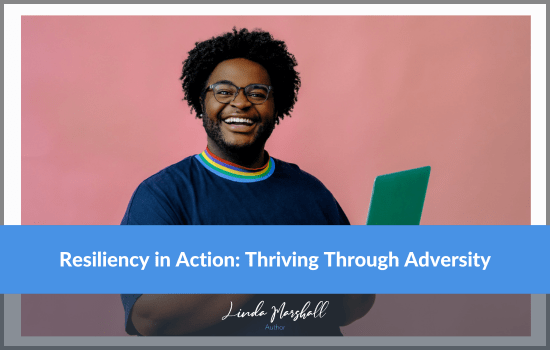Resilience is not just within our reach; it’s a vital skill for well-being. Individuals with high emotional intelligence manage adversity more effectively and cultivate emotional resilience, enabling them to navigate life’s challenges with confidence and adaptability. By fostering a growth mindset, refining coping strategies, and embracing personal development, you can strengthen your resilience and emerge stronger from life’s trials.
THE POWER OF EMOTION | CHAPTER 20 | OVERVIEW
The Power of Resilience: Your Key to Overcoming Adversity

Life is full of unexpected twists and turns, testing our strength and resolve. At the heart of overcoming challenges lies resilience, our ability to adapt, grow, and thrive in the face of difficulty. Far from being an innate trait, resilience is a skill that can be cultivated and strengthened over time.
Individuals with high emotional intelligence excel at managing adversity because they harness emotional resilience as a tool for personal growth and balance. They don’t just endure challenges; they transform them into opportunities for development.
So, how can you cultivate resilience to navigate life’s inevitable ups and downs? Let’s explore its impact on well-being and the strategies you can use to build it.
Building a Resilient Mindset: Resilient Thinking and Attitude
One of the most powerful tools for resilience is a growth mindset, the belief that challenges are opportunities to learn and improve. As I discuss in my book, The Power of Emotion, adopting a growth mindset shifts our perspective, allowing us to face adversity with optimism and determination. Instead of seeing obstacles as roadblocks, we view them as stepping stones to success.
Think about a time when you faced a setback. What did you learn from it? How did it shape you? Resilient individuals use difficult experiences as fuel for personal development, embracing change rather than fearing it.
Why Resilience is Essential
Resilience plays a critical role in navigating life’s challenges. Here’s why it’s so vital:
-
Empowers Effective Coping – Resilience equips us to handle setbacks without losing emotional balance.
-
Fosters Personal Growth – Turns challenges into opportunities for self-discovery.
-
Enhances Problem-Solving – Strengthens the ability to find solutions in tough situations.
-
Supports Meaningful Relationships – Emotionally resilient people build deeper connections.
-
Promotes Adaptability – Helps embrace change and transition with confidence.
Resilience’s Profound Impact on Well-Being
Resilience does more than help you bounce back—it enhances your overall well-being. Here are the key benefits:
-
Improved Mental Health – Reduces stress, anxiety, and depression by fostering optimism.
-
Enhanced Emotional Regulation – Strengthens the ability to manage emotions effectively.
-
Stronger Relationships – Deepens emotional intelligence and connection with others.
-
Better Physical Health – Encourages healthy habits like exercise, nutrition, and sleep.
-
Empowerment and Confidence – Enables you to take risks and pursue goals fearlessly.
10 Strategies to Strengthen Resilience
Building resilience requires practice and dedication. Here are ten actionable strategies to develop this powerful skill:
-
Regulate Your Emotions – Manage stress and anxiety effectively.
-
Adopt a Positive Mindset – Focus on solutions rather than problems.
-
Seek Social Support – Surround yourself with a strong network of friends and family who provide encouragement and stability.
-
Embrace Adaptability – Welcome change with an open mind.
-
Practice Self-Compassion – Treat yourself with kindness during tough times.
-
Hone Problem-Solving Skills – Approach difficulties with a strategic mindset.
-
Prioritize Physical Health – Take care of your body to support mental resilience.
-
Mental Health Support: Seek professional guidance when needed to gain tools for managing adversity.
-
Learn from Adversity – View setbacks as opportunities for growth.
-
Use Healthy Coping Strategies – Engage in mindfulness, meditation, or creative outlets.
Which of these strategies resonates with you the most? Start by focusing on one today!
Emotional Intelligence: The Key to Resilience
Resilience and emotional intelligence go hand in hand. People with high emotional intelligence excel at recognizing and managing their own emotions, as well as understanding others. This self-awareness fuels adaptive problem-solving, effective coping strategies, and stronger relationships, all crucial elements of resilience.
By strengthening your emotional intelligence, you’re also fortifying your ability to navigate adversity with grace and confidence.
Resilience is a Skill Worth Developing
Resilience isn’t something you’re born with; it’s something you build. By embracing resilience and emotional intelligence, you’ll be better equipped to face life’s inevitable setbacks with strength and determination.
Be patient with yourself as you develop this skill. Every challenge presents an opportunity to grow stronger and more resilient.
Want to dive deeper? Explore my books, The Mindful Journal and The Power of Emotion, for additional insights and actionable strategies. Let resilience and emotional intelligence guide you as you navigate life’s challenges and unlock your full potential. Ready to take action? Start by choosing one resilience strategy and applying it this week. Share your thoughts in the comments or connect with me to continue the conversation!
This article was originally published on September 28, 2021, and has been updated (February 2025).
Get Social With Linda Marshall and Share
INSTAGRAM @LindaMarshallAuthor | FACEBOOK @LindaMarshallAuthor


